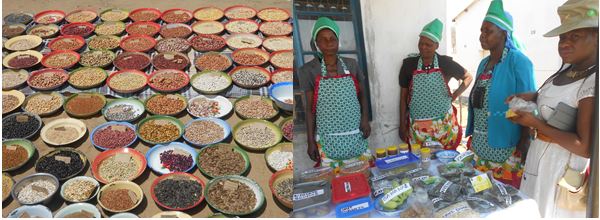If African agriculture is to be truly transformative, there is need for disruptive thinkers who can revisit boundaries between smallholder and large scale farmers. These boundaries have extended from physical (size of land) to the mind-set, creating unsustainable mental blockages. Most smallholder farmers have bought the myth that they cannot think big and challenge conventional mental chains. Yet when you compare commodities from smallholder farmers with those from large scale farmers in the market, those from smallholder farmers tend to be superior in quality and appearance.

A culture of disruptive thinking that seems to dominate innovation around communication technology is not rapidly finding its way into African agriculture where most methods remain traditional. Rather than looking at agriculture as a holistic ecosystem, actors are busy compartmentalizing producers in line with land holdings instead of the size of their brains. Disruptive thinking should see more innovative models based on changing consumer patterns. Contract farming models have hogged the agricultural landscape for too long without much creativity. Some of the disruptive thinking should come via agricultural financing models.
Helping farmers to connect with their purpose
One of the reasons African farmers are tossed from one model to another is because they have not fully connected with their purposes. Farming for subsistence is not a solid purpose because we have seen some food crops become cash crops depending on circumstances. Purpose will give farmers the power to eliminate distracting options from many directions. Assuming finding purpose is like finding fire, igniting fire in African agriculture will help farmers find purpose. Their purposes peak out in the stories they tell each other in the market and field days. Finding a purpose is a gradual process rather than a bolt of lightning. The majority of farmers have absorbed enough knowledge about how to produce certain crops and keep certain livestock. A missing link has remained the purpose of doing all these noble things. With a clear purpose, they would not be caught completely off-guard by drought, market collapse and other calamities.
Due to the absence of purposeful knowledge, many farmers sleep-walk through opportunities. Feeling powerful is necessary for farmers to view their challenges as opportunities. On the other hand, dependency on hand outs leads to hesitation, anxiety and discouragement. Without power and self-confidence, the ability to get things done is minimized. Instead of continuing to give farmers hand outs and treating them like irresponsible children, it is important to let them control their outcomes since they have received many kinds of agricultural training. It is important to establish mutually designed accountabilities and let farmers to live up to their abilities as competent food producers.
Rejecting assumptions that have outlived their usefulness
Besides the mistaken notion that a farmer’s ambition levels corresponds to the size of his or her land, some of challenges for young Africans keen to get into agribusiness relate to capacity building for accessing funding. Many challenge funds being launched for African youths have borrowed the Big Brother African model where one pitches an idea in front of a panel of judges who then decide whether it makes business sense or not. Unfortunately, most of the judges know very little about the dynamics of African agriculture and business. The whole thing is reduced into a meaningless competition that does not help youths to make their visions of exploiting natural resources a reality.
The majority of SMEs who are driving African economies did not start their businesses through pitching their ideas in front of some judges. A serious and sustainable agribusiness idea cannot be judged within a few minutes and the judge is able to know everything about it, including its potential. Most successful SMEs in agribusiness started by making their ideas near enough to be attainable and distant enough to be meaningful. If an idea can be completely painted and understood with all numbers visible, it means the vision is too small. In dynamic African contexts where information and opportunities are very fluid, you can’t claim to see all viability angles at once. Numbers, plans and metrics are not enough. You need other elements such as intuition and empathy.
African agribusiness is also about focusing on the pain points, including facts and breathing into aspirations as well as leveraging engagement. This can only be done by disruptive thinkers who can see agribusiness as an intuitive process where actors should have enough awareness to block distractions and focus on what matters. Trying to summarize the whole business development journey into a pitch undermines the evolution of diverse businesses. Like every important undertaking, agribusiness is characterised by high energy moments, behaviours that come naturally and unique ways that add the most value. That is why some businesses have been conceived by accident.
The power of data and gut feelings
Embracing disruptive thinking means combining data and gut feelings to drive the new agricultural renaissance that is confronting African countries. Farmers and all value chain actors need content that can help them deepen and sustain their positive ideas and attitudes. Local institutions have to ditch rudimentary approaches to gathering information. Focusing too much on tools is leading to large chunks of knowledge to be missed. A toolbox is not enough partly because most toolboxes are not embedded into the work practices of farmers and supporting organisations. With most value chains and niches rapidly becoming over –crowded and hyper-competitive, farmers and other value chain actors will have to engage their customers at both emotional and logical levels.
charles@knowledgetransafrica.com / charles@emkambo.co.zw / info@knowledgetransafrica.com
Website: www.emkambo.co.zw / www.knowledgetransafrica.com
eMkambo Call Centre: 0771 859000-5/ 0716 331140-5 / 0739 866 343-6
